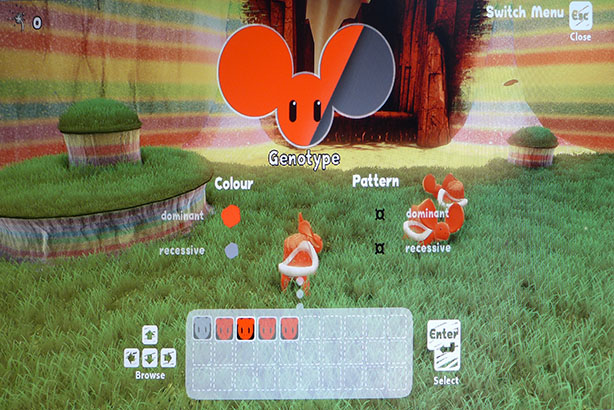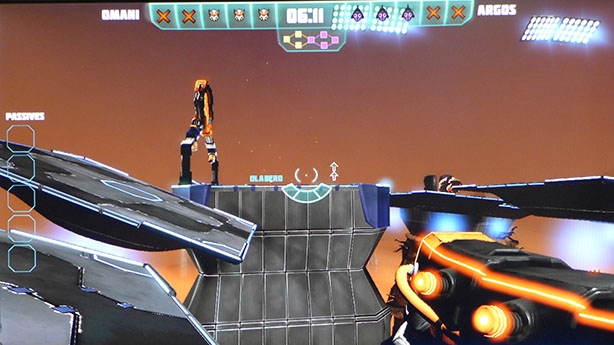Just how difficult is it to develop a computer game? Well, just ask the four teams competing in Epic Games' Make Something Unreal Live competition currently drawing to a close at the Gadget Show Live at the NEC in Birmingham.
The competition tasks teams of university students to develop a full 3D game demo in just five months using the freely available Unreal Development Kit. The prize? The opportunity to bag themselves a full Unreal Engine 4 development license.
This year the guiding theme was of ?Mendelian inheritance: genetics and genomics?. This broad yet subtly complex theme is quite a challenging one to convey in the mechanics of a computer game but the teams have had a little help. Advice on the science side has come from the Sanger Institute while on the gaming side Climax Studios, Lucid Games, Ninja Theory and Splash Damage have all lent a hand.
Kicking off in October last year, the dozens of entrants have been whittled down to just four who are spending this week putting the final touches to their games, not from the comfort of their homes or university dorms but under the watchful gaze of thousands of members of the public who are visiting the Gadget Show Live.
The winners of the competition will be announced at the end of the show on Sunday evening but earlier in the week we got the chance to play on all the games to see just what a bunch of no good layabout students can achieve in five months, and the answer is rather a lot...
Beings
University: University of Abertay, DundeeTeam/Company Name: Team Summit
Team Members: Gaurav Pant - Programmer and PR Manager, Vijay Kesiraju - Lead Programmer, Claudio Bozzotta - Designer, Clement Marcou - Producer and Artist
Beings is in some ways the most surprising game of the bunch because it is targeted at a very young audience. Aimed at players of 3 years+, it combines rainbow coloured, twee visuals, soporific gentle music and easy to pick up platforming gameplay to create a surprisingly effective my-first-genetics-lesson feel.

The player is tasked with controlling a floppy-eared rabbit-like creature with - bizarrely enough - a jelly on its back. To progress through the game this creature has to upgrade itself by breeding with the female bunny creature and taking on its genetic powers - fire resistance, higher jumping ability, etc. But, to become sufficiently attractive to the female you must first collect all the stars scattered around the level.
It's an intriguing concept, though we're a little unsure of the flirty precursor to the two creatures mating - maybe it would go straight over the head of a three year old but to us it seemed a little too suggestive.
This was the most polished of the games at the time we played them with genuinely enchanting visuals and sound as well as having the most clear in-game instructions on how to play. But, to us the gameplay did seem siultanesously to be a little to easy for older players and perhaps too complicated for smaller children - certainly the genetics mechanic would go over the heads of most children under 5, we would have thought. Plus, the demo was extremely short. It is longer than shown in our video, but not by much. Still we like that the team has tried something different and are looking forward to seeing what can be achieved by the time the competition ends.
What has the biggest challenge been?
The biggest challenge that we faced in this competition is that we are just four people against a whole lot. Being the smallest team, competing against teams that already have sponsors and proper work spaces, its like a David-Goliath scenario going on here. This means that we have to work three times more than the others to prove our worth, and I am glad that we have made our mark and have done so.
What you would use the Unreal Engine 4 license for?
Well, when we receive the licence, we shall work further on our project and bring out as a completed title. Once this is achieved, we would like to take up a new project that could show off and utilize the true potential that the Unreal Engine 4 has to offer.
What advice you would give others who are looking to make a start in games development?
Well if it comes to advice, I would just like to say that have a clear idea about what you intend to do and stick to it till the end with all your passion. Keep an open minded and listen to other's suggestions but do not get intimidated and completely change your gameplay. Be optimistic and hopeful. Try to find out your weaknesses as you can yourself be your best critic. As people say that problem identified is problem half solved.
Epigenisis
University: Blekinge Institute of TechnologyTeam/Company Name: Dead Shark Triplepunch
Team Members: Michael Levall - Project and Creative lead, Tobias Johansson - Level Design / PR, Jonas Vigstrand - UI Designer, Martin Bergman - 3D Artist, Carl Bostr?m - 3D Artist, Henrik Giang - Lead Artist, Andr? J?nsson - VFX and 3D Artist, Jonathan Wising - Lead Programmer, Joakim Westblad - Balance Designer and Programmer, Ola B?ckstr?m - Audio Lead
Easily the most instantly playable and fun of the games on showm, at least for experienced gamers, was Epigenisis. It's a sports game that feels like a cross between basketball and Unreal Tournament capture the flag. Teams must capture the ball placed in the centre of the map and throw it through the other team's goal on the opposite side of the map.

Players can shoot at each other with weapons that, rather than injuring each other, knock the other players aside. With the map being made up of a series of small squares suspended in space, a blast or two will generally result in a fall to oblivion - a five second wait and you respawn to start again.
The genetics bit comes into play when a team has scored a goal. The prize for each goal is a seed which the team can then plant on one of the squares. These grow into various plants that help the team out, such as a tree type plant that shields the team or a smoke emitting plant that produces a one-way smoke screen.
It's a pretty tenuous link to the brief but the game is instantly good fun and we can genuinely see a broad audience getting involved upon a full release.
What has the biggest challenge been?
The biggest challenge has been getting people to understand everything in the game. We have been play-testing the game since day one to make sure people understand it. We are definitely getting towards that goal. People here at Gadget Show Live that plays the game picks the concept up within just a few minutes which is great, and that is as I said something we have worked extremely hard with. So we feel really happy when we see people playing it and having fun with it.
What you would use the Unreal Engine 4 license for?
The first thing we would think about is if we should port Epigenesis to the new engine. That however would delay the game so it's a fine line if we should do that or not. But other than that we don't really dare to talk about what we would do with it. All the teams here have a great change of winning so it feels a little bit scary to discuss what we would do if we win. However as I said we have some ideas in store if we get the license.
What advice you would give others who are looking to make a start in games development?
Start small. Don't think your first game is going to be Minecraft or Super Meat Boy, those games both took several years to make and if someone just starting with game development sets out on a task like that it's most likely you never finish the first game.
So start really small and with something easy. There are excellent engines to get people started in games. Game Maker is a good thing to start out with, it's easy to grasp and easy to get started. And start by doing a small clone of something like the first Super Mario Bros. in it, but begin with only walking and jumping. The rest of the things you should add as you learn more.
Later when you feel more confident and have learned some game development, begin looking into UDK and other 3D Engines. It's a harder task of getting into a 3D engine so don't feel discouraged when starting, there are a lot of free tutorials that you could use. But still keep the games small and make sure you finish the games rather than thinking about doing something too big. For us on Dead Shark we would also recommend reading Game Design - The book of lenses by Jesse Schell.
Source: http://www.bit-tech.net/gaming/pc/2013/04/05/make-something-unreal-live-2013-contestants/1
London 2012 closing ceremony Shark Week 2012 evelyn lozada UFC 150 Caster Semenya Medal Count 2012 Olympics victoria beckham
No comments:
Post a Comment
Note: Only a member of this blog may post a comment.